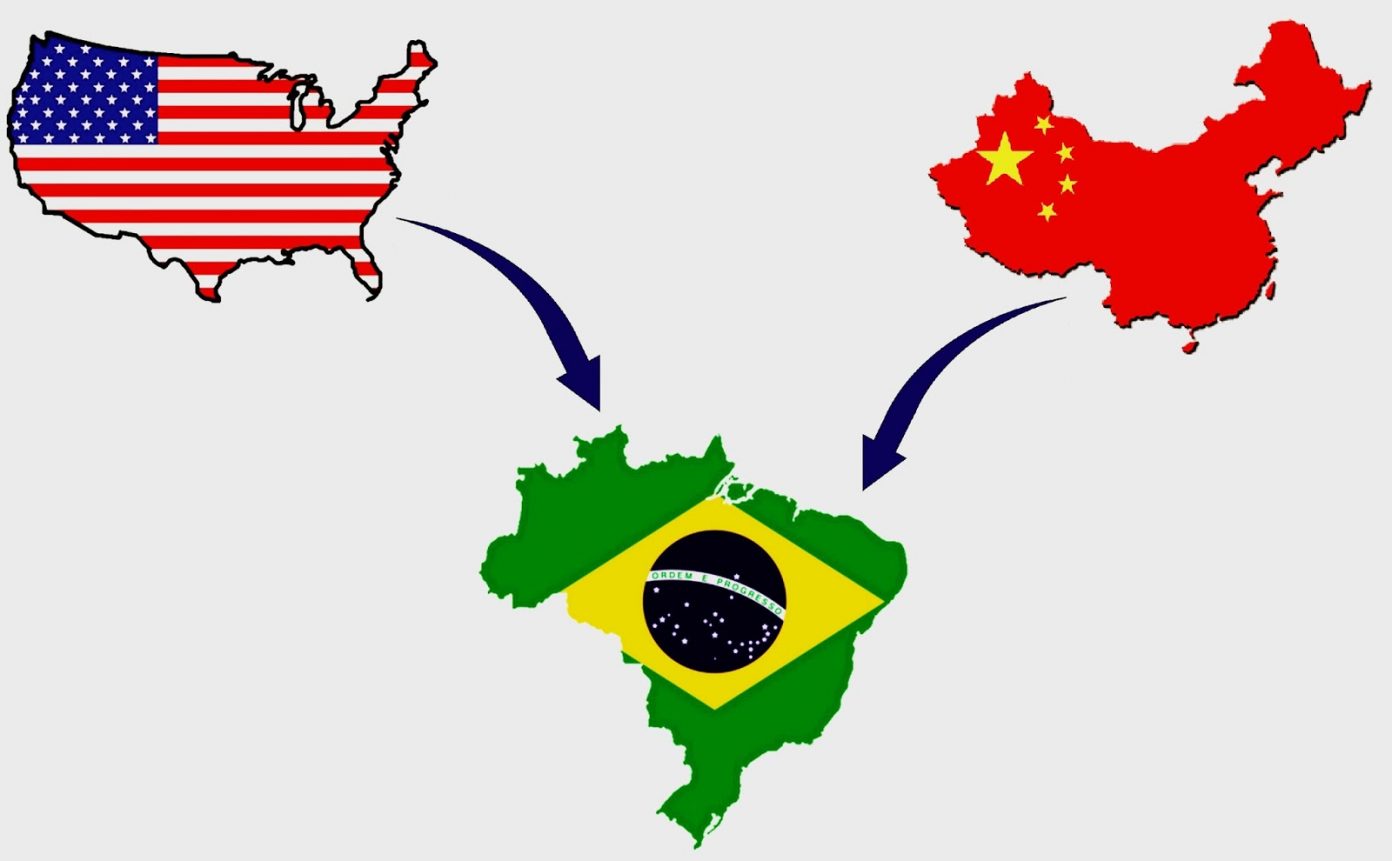
Published 02/13/2023 12:40 | Edited 2/13/2023 1:52 PM
Lula finds himself not only faced with the imperative of national reconstruction, but of resuming Brazil’s international protagonism. This challenge becomes particularly complex in view of the systemic transition and growing Sino-US competition.
Lula’s visit to the US
On February 10, President Lula visited Joe Biden, the US head of state. In the Brazilian delegation, in addition to the president, ministers Mauro Vieira (Foreign Relations), Fernando Haddad (Finance), Marina Silva (Environment), Anielle Franco (Racial Equality), the Special Advisor, Ambassador Celso Amorim, the Secretary executive of the Ministry of Economic Development and Commerce, Márcio Elias Rosa, and Senator Jaques Wagner.
Before the meeting with President Biden, Lula gave an exclusive interview to Christiane Amanpour, from the CNN network. In it, he addressed various topics, such as attacks on democracy in Brazil, the role of the military in politics, the lawsuits against former President Bolsonaro, the war in Ukraine, political polarization and the strength of the extreme right, as well as environmental issues. .
The democratic issue was certainly a point that brought the two presidents together. The coup episodes of January 8 in Brasilia and the parallels with the process that culminated in the invasion of the Capitol in Washington, in 2021, revealed the reciprocal need to isolate the extreme right. Lula, despite his great support in international circles of power, needs to strengthen his internal legitimacy, given that a large part of the business community and the middle classes are strongly anti-Lulist, and have the strength to face Bolsonarist opposition in Parliament.
However, there are divergences in this democratic agenda. Biden organized a Summit for Democracy in December 2021, directing his speech against non-aligned countries, notably China, Russia, Iran and Venezuela. Lula, in turn, despite his interest in the democratic front turned against the rise of the extreme right, follows his pragmatism and the principle of non-intervention in domestic affairs. Not only that, Lula has demonstrated that he does not adhere to the line of trying to isolate Venezuela and Cuba and is still opposed to US sanctions as a way of dealing with these countries.
In addition to democracy, the meeting also brought other issues to the bilateral agenda, such as environmental issues, especially the climate issue; productive investments, especially in clean energy; and human rights, particularly in the fight against poverty and racism. In the Joint Declaration, among other indications, they “committed to revitalize the US-Brazil Joint Action Plan for the Elimination of Racial and Ethnic Discrimination”; “recognize the leadership role that Brazil and the US can play through bilateral and multilateral cooperation, including under the United Nations Framework Convention on Climate Change (UNFCCC) and the Paris Agreement”; and decided to discuss “the fight against deforestation and degradation, the strengthening of the bioeconomy, the implementation of clean energy, adaptation actions and the promotion of low carbon agricultural practices”[1].
President Lula also said that President Joe Biden was willing to participate in the Amazon Fund with an estimated value of US$ 50 million. The fund, created 15 years ago to finance actions to reduce emissions from forest degradation and deforestation in the Amazon, relies on international donations and has already received funds from Norway and Germany. Lula made it clear, however, when speaking to the press in front of the White House, the official residence of the US government that he does not want to “transform the Amazon into a sanctuary for humanity” or give up Brazilian sovereignty over the region.
Lula also said that Brazil has marginalized itself in the last four years, as Jair Bolsonaro “did not like to maintain relations with any country” and “belittled international relations”. According to Lula, Bolsonaro is a faithful copy [de Trump]. He doesn’t like unions, he doesn’t like workers, he doesn’t like women, he doesn’t like blacks, he doesn’t like talking to businessmen, he doesn’t like talking to the press.”[2]. At the end of Lula’s speech, Biden smiled and said he was very familiar – in allusion to his predecessor’s way of doing politics.
Lula’s pragmatism and experience together did not allow Biden to guide the meeting. The current US president pressed for Brazil to side with Zelensky in the war in Ukraine. However, President Lula had already denied involvement in the conflict at the meeting with the French President, Emmanuel Macron, and with the German Chancellor, Olaf Scholz, last week, on a recent visit to Brasília. Lula not only rejected both cases, but also his intention to create a group of countries to seek peace. The Brazilian president made it clear in a press conference that he will not join a New Cold War – and has already scheduled a visit to China.
Lula also met with Democrats Pramila Jayapal (Washington), Alexandria Ocasio-Cortez (New York) and Sheila Jackson Lee (New York) at Blair House, and also with Senator Sanders, from the Democratic Party. Sanders and Lula highlighted the imperative of strengthening the foundations of democracy, with emphasis on the risks of misinformation. Both Trump and Bolsonaro based their political actions on the spread of fake news and the weakening of state institutions.
What is clearly observed is that the US is now disputing Brazil’s international position with the new Lula government. It is known that Brazilian influence is significant throughout the South American region and that current Brazilian diplomacy must converge with international movements aimed at strengthening the multipolar order. For Lula, it was not a question of obtaining great conquests from the US – which the US seems unable to offer, as it became clear. The objective is to establish a good channel for dialogue and prevent the US from becoming an obstacle to the global movement of Brazilian diplomacy.
Brazil and triangular relations
The US was, during the 20th century, Brazil’s main trading partner. That position was supplanted by China in 2009, and since then its share of foreign trade has changed significantly. In 2022, the US accounted for around 14% of Brazilian foreign trade, while China was close to 27% – that is, almost double the US share. Obviously, this redirection of the trade flow, but also of investments and cooperation agreements, reflects deep systemic changes and influences Brazil’s international insertion.
In 2022, bilateral trade between Brazil and the US reached US$ 88.7 billion. This year, Brazil imported US$ 51.3 billion and exported US$ 37.4 billion to the United States, with a deficit of US$ 13.9 billion. Despite the trade deficit, the export basket has a higher added value compared to exports to China, as we will see.
Unlike the USA, China has provided systematic surpluses for Brazil – in the last six years alone, the Chinese market has brought us around US$ 180 billion in trade surplus. In fact, since 2002, before Lula took office, the trade flow went from US$ 4.4 billion to almost US$ 68 billion when President Dilma was overthrown in 2016. And despite Bolsonaro’s erratic diplomacy, in 2022 the trade totaled $150 billion – accounting for a $28.9 billion surplus or almost half of the $61 billion total.
In Brazil, the historical connection with the US and its allies produced a socialization and mentalities linked to US ideologies and lifestyle. The pro-USA political and social forces in Brazil are composed mainly of right-wing parties, business, the mainstream media and sectors of the middle and upper social classes, especially the more cosmopolitan segments that share a greater affinity with this western field. Recently, under the Bolsonaro government and the strengthening of the far right.
With the election of the Lula government, Brazil must make a shift in its foreign policy, once again emphasizing South-South cooperation and the BRICS. Because it is a very heterogeneous government coalition, there are very different political groups and perspectives. In fact, Brazil today is experiencing a latent contradiction. On the one hand, our socialization makes cultural and ideological inclinations towards the US. On the other hand, the foreign market and economic gains are increasingly dependent on China. In a word: the Brazilian elite dreams of Miami but has its pocket tied to Shanghai. Perhaps the most illustrative sector is agribusiness itself, whose dependence on the Chinese market is enormous, but with total alignment with former President Bolsonaro.
Given this scenario, everything indicates that Lula will seek to extract the best possibilities in the face of the systemic transition and growing multipolarization. A foreign policy that bargains for the best conditions for international insertion and serves to leverage national development. In other words, what we do know is that Lula will not carry out any type of automatic alignment, according to Itamaraty’s own tradition – broken by Bolsonaro when he aligned himself with Trump.
In short, Lula knows that the US does not have the same conditions as the former post-war hegemonic power. The recent meeting did not even produce a sign of large investments or important cooperation agreements. Brazilian diplomacy should give priority to South-South cooperation, especially the South American integration process, which includes resuming and boosting CELAC and UNASUR. China, as a rising power, emerges as a field of possibilities and greater opportunities for Brazil, although our exports to the Asian country are concentrated in primary products, especially soy, oil and iron ore. This is just one dimension of a problematic Brazilian de-industrialization that dates back to the 1980s. In fact, between 1995 and 2020, we moved from the 25th position in the ranking of economic complexity to the 60th – while China went from the 46th to the 17th[3]. That is, we are not dependent on China, but on commodities.
Since the end of the Dilma government, starting in 2014, the economic situation in Brazil has deteriorated rapidly. According to data from the second calculations by the FGV research center (Fundação Getúlio Vargas), Brazil ended the decade from 2011 to 2020 as the worst for the economy in 120 years, with an average GDP growth (Gross Domestic Product) of just 0. 3% – including three years of decline, 2020 -4.3%, 2016 -3.3% and 2015 -3.5%.[4] In 2021 and 2022, in a context of the Pandemic, whose management was disastrous in Brazil, the socioeconomic situation became even more problematic, making food insecurity extremely serious.
Finally, it is a disruptive historical period of systemic transition. China is a key country for achieving a multipolar order as opposed to the neoliberal and unilateral one promoted by Washington. China can also become a key variable to leverage our industrialization, as long as investments and cooperation agreements are conditioned by technological transfers and joint ventures. It is therefore up to Brazil to carry out an accurate reading of the opportunities and challenges to boost national development and occupy a place in the international system compatible with its stature.
[1] See Joint Declaration: https://br.usembassy.gov/pt/declaracao-jointa-da-reuniao-entre-os-presidentes-lula-e-biden/
[2] See the article “Understand point-by-point meeting between Presidents Lula and Biden in the United States” by O Globo: https://oglobo.globo.com/mundo/noticia/2023/02/entenda-saldo-de-encontro-entre-presidentes -squid-and-joe-biden-in-the-united-states.ghtml
[3] See ranking available at: https://oec.world/en/rankings/eci/hs6/hs96
[4] See the report by Poder 360: https://www.poder360.com.br/economia/brasil-tem-pior-decada-para-a-economia-em-120-anos/
Source: vermelho.org.br

